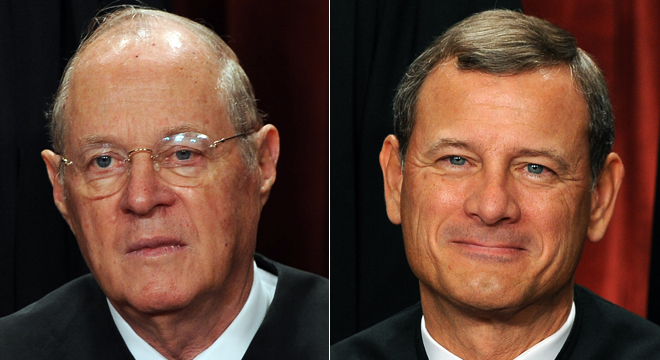Chief Justice John Roberts and Justice Anthony Kennedy — two critical swing votes in the health care reform case before the Supreme Court — asked skeptical questions about the individual mandate Tuesday, but rounded out the arguments with some sympathy for the federal government’s broad power to regulate health insurance.
With reform supporters battered by early analysis suggesting the court’s conservatives were hostile to the health care law’s requirement that Americans purchase health insurance, Roberts’ and Kennedy’s more balanced questions renewed hope that the law will be upheld.
Indeed, with the four justices comprising the court’s liberal wing likely to uphold the mandate, the outcome seems destined to hinge on Kennedy and Roberts. And though the two conservatives didn’t fully betray their leanings, the Obama administration and supporters of health care reform almost certainly only need one of their votes to prevail.
Kennedy asked the Obama administration’s lawyer Donald Verrilli whether requiring people to buy a good “changes the relationship between the individual and the government in a very fundamental way.”
He suggested that there’s a “heavy burden” on Congress to show that it is authorized to do so under the Constitution, inquiring whether there are “any limits under the Commerce Clause” if the mandate is allowed to stand.
“Can you create commerce in order to regulate it?” Kennedy said.
Roberts also asked Verrilli tough questions about the limits of federal power if the mandate is upheld, including how to distinguish between health care and other markets.
“Can the government require you to buy a cell phone?” he asked, in order to make sure people have access to emergency services and police assistance when they need it.
Verrilli argued that the individual mandate falls comfortably under the federal government’s Commerce Clause authority to regulate economic activity with a substantial effect on interstate commerce. The “limiting principles” of congressional power, he said, have to do with regulation that is local and non-economic.
Despite their tough questions, both Kennedy and Roberts indicated sympathy with the view that health insurance is a unique market that may require a unique approach to regulate — and that’s central to the constitutional question at hand.
“I think it is true that if most questions in life are matters of degree,” Kennedy said, “in the insurance and health care world, both markets — stipulate two markets — the young person who is uninsured is uniquely proximately very close to affecting the rates of insurance and the costs of providing medical care in a way that is not true in other industries.”
Kennedy added that the uninsured “are in the market in the sense that they are creating a risk that the market must account for.”
Despite his initial skepticism, Roberts later seemed persuaded of the uniqueness of the health care market.
“Everybody is in this market,” Roberts told the lawyer for the Republican opponents. “So that makes it very different than the market for cars or the other hypotheticals that you came up with, and all they’re regulating is how you pay for it.”
Justices Stephen Breyer, Ruth Bader Ginsburg, Sonia Sotomayor and Elena Kagan have long been seen as likely votes to uphold the mandate, and their lines of questioning Tuesday didn’t indicate otherwise. Justice Clarence Thomas is seen as a lock against the law, while Justices Antonin Scalia and Samuel Alito indicated little sympathy for the mandate.










